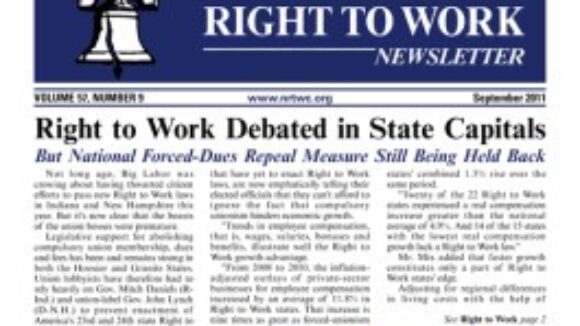Ethics Violator: Craig Becker
The American Spectator looks behind the curtain at the man primarily responsible for turning the National Labor Relations Board into a vehicle for big labor advocacy -- former SEIU General Counsel Craig Becker. But in doing so, Becker violated ethics pledges made by his boss, President Obama.
For the last few months, Boeing has been clashing with the National Labor Relations Board (NLRB) over its decision to locate a plant in South Carolina. The NLRB argues that the airplane manufacturer illegally moved work from union factories in Washington state to a new $1 billion facility in the right-to-work Palmetto State.
NLRB lawyers maintain this is straightforward retaliation against union workers, based on comments allegedly made by Boeing executives themselves. Business leaders have denounced this as an unprecedented bit of federal pro-union advocacy, with the House of Representatives last week voting to halt the Boeing case and others like it.
The battle may soon intensify. Federal financial disclosure forms reveal that Craig Becker, a key union-friendly vote on the NLRB, owned stock in Boeing at the beginning of this year. Becker is one of federal agency's Democratic board members.
According to documents obtained by the National Right to Work Committee, as of January 2011 Becker owned between $1,001 and $15,000 in Boeing stock, earning between $201 and $1,000 in dividends. This particular public financial disclosure report does not require more specific information.
The disclosure already has people detecting a potential conflict of interest. "The fact that Mr. Becker owns or owned stock in Boeing could be extremely detrimental to the NLRB's case against that company," says F. Vincent Vernuccio, labor policy counsel at the Competitive Enterprise Institute. "If Mr. Becker currently owns stock in Boeing then he should recuse himself from hearing the case."
Any recusal could imperil the NLRB's ability to take the Boeing case at all. Since former member Wilma Liebman's term expired, the normally five-member board is down to just three members. "The Supreme Court recently ruled that the NLRB must have three members or there will be no quorum," says Vernuccio. "If Becker is not able to sit on the case there can be no decision for Boeing."
Another labor policy watcher familiar with Becker's Boeing investment acknowledges it is a relatively small amount of money. "But how big does it have to be before there can be a conflict of interest?" he asks. "It's not like there is a minimum where it would be okay."
Becker, a perennial labor lightning rod, has faced calls to recuse himself before. A former lawyer for the AFL-CIO and SEIU, Becker said in a footnote to a June 2010 ruling that he would recuse himself from cases in which either of those unions was a party. Becker cited compliance with the Obama administration's ethics policy as his reason for bowing out of those decisions.



